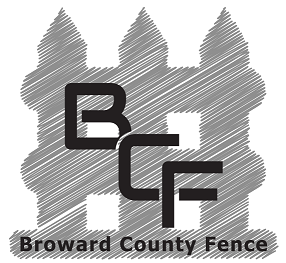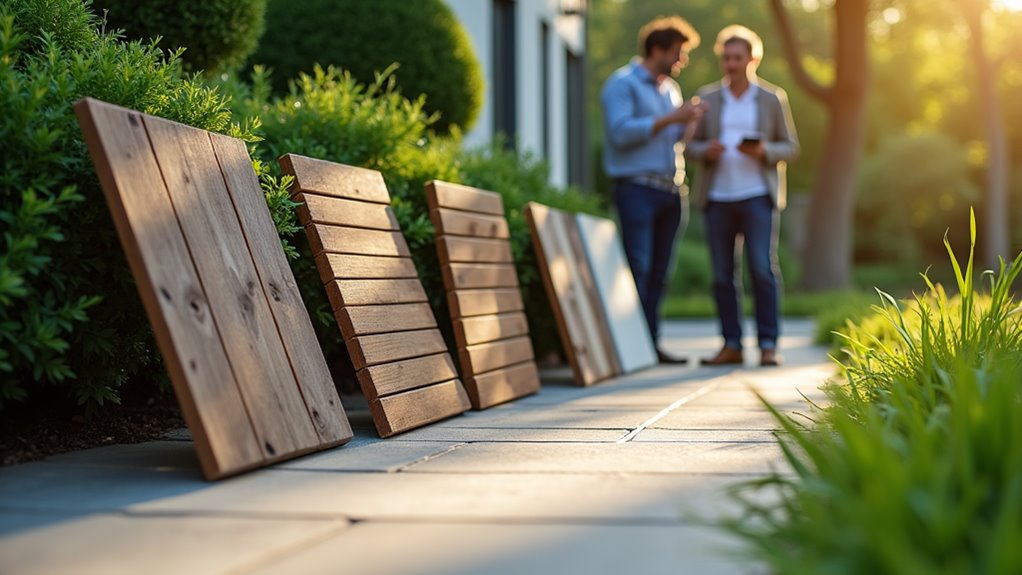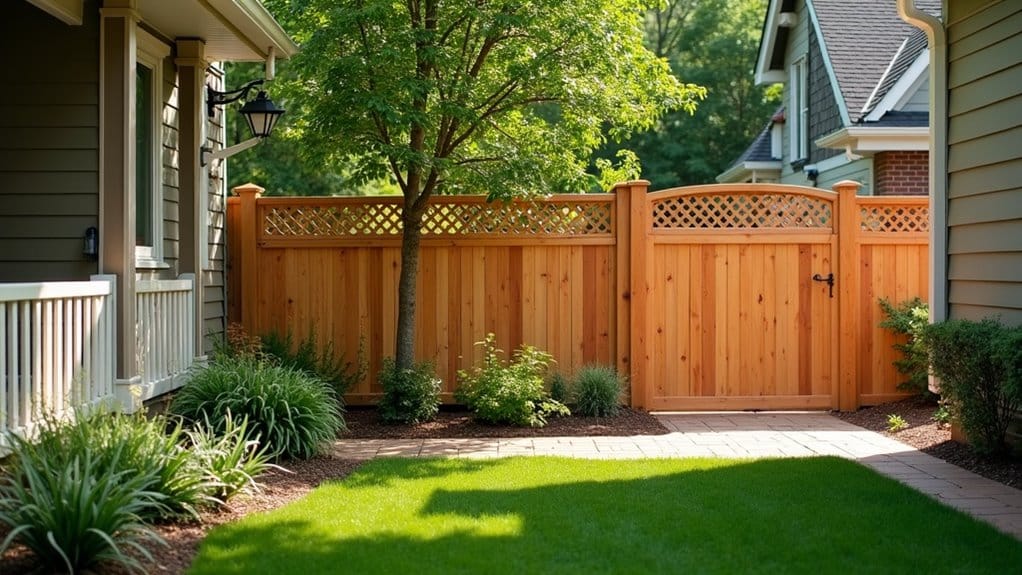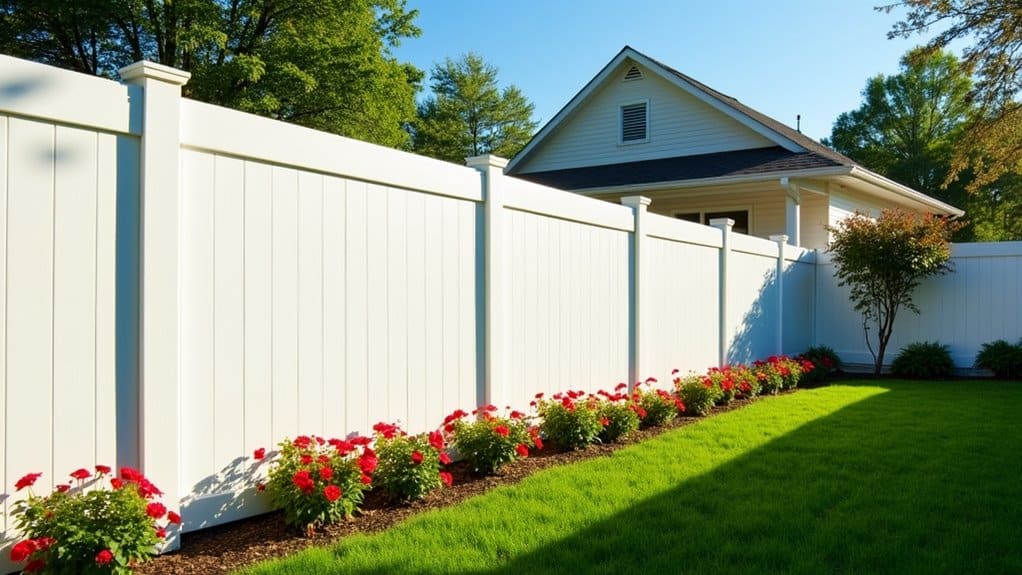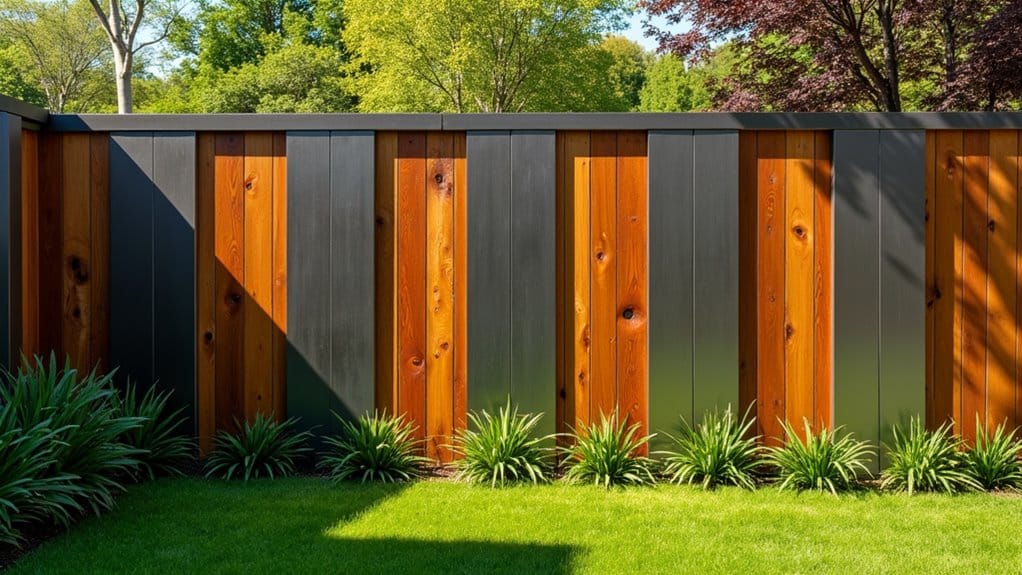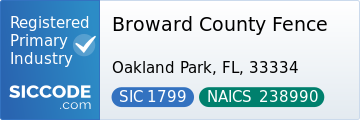When choosing a fence for your commercial property, start by assessing your security needs and potential threats. Think about how the fence reflects your brand and ensure it complies with local zoning laws. Consider aesthetics; select materials and colors that complement your building's design. Durability is crucial, so opt for low-maintenance options like vinyl or sturdy wrought iron. Clearly defining your property boundaries can help avoid disputes with neighbors. With thoughtful planning, you can achieve a balance between functionality and style.
Key Takeaways
- Begin by assessing your property's security needs. For example, if you're in a high-crime area, a taller, more secure fence may be necessary.
- Check local zoning laws to ensure your fence complies with height and material regulations. Don't skip this step; it could save you from costly fines.
- Choose durable materials like vinyl or wrought iron that fit your budget and require little maintenance over time.
- Pick a design and color that match your brand. For instance, a sleek black fence can enhance a modern business's appeal.
- Don't forget to include installation costs in your budget. Consider expenses for labor and any added features like gates or security systems.
Purpose of Commercial Fencing
Fencing is a key element in boosting the value and appeal of your commercial property. A well-chosen fence enhances aesthetics and makes your property more attractive to buyers or tenants, potentially leading to higher sale prices or rental rates. Additionally, fencing clearly defines property boundaries, helping to prevent disputes with neighboring businesses and providing legal clarity over access to your premises. A thoughtfully designed fence also reinforces your brand image, creating a unified look that aligns with your company's identity. Moreover, a sturdy fence can act as a physical barrier against intruders, ensuring the security of your assets and enhancing the overall sense of safety on your property. Investing in quality fencing materials can lead to a 70% return on investment, making it a financially sound choice for your commercial establishment.
Security Needs Assessment
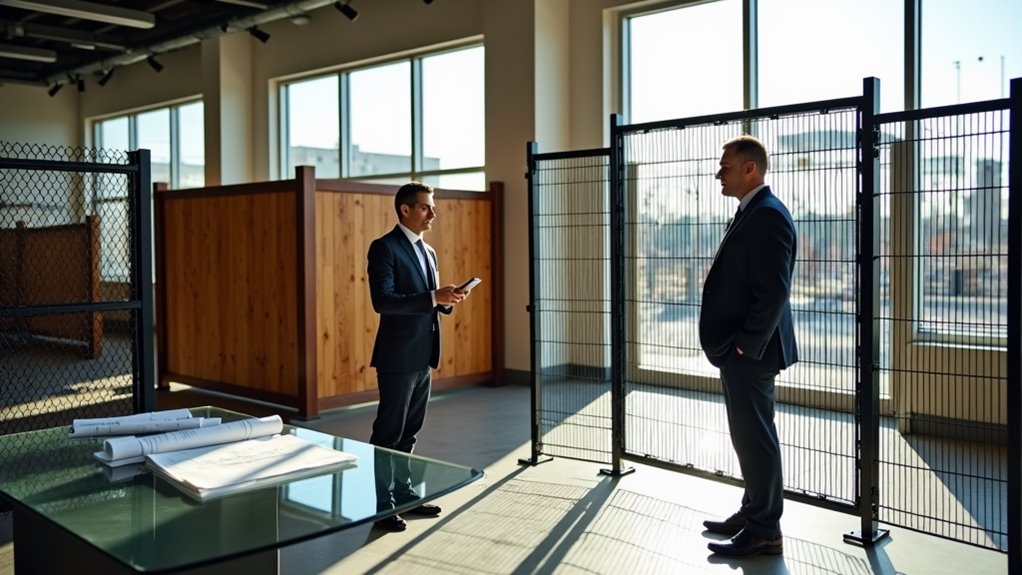
A security needs assessment is essential for protecting your commercial property. Begin with a thorough security evaluation that includes a threat analysis. Identify risks like burglary, vandalism, and unauthorized access. Assess the value of your assets, including equipment and staff, to determine the necessary security level. Additionally, consider conducting a security needs assessment to better understand the specific vulnerabilities of your property.
Next, examine all access points to pinpoint areas needing restriction or control. Review past incidents to identify weaknesses and consider the crime rate in the surrounding area, as it impacts your security needs. Conducting a security needs assessment helps identify specific building types that face unique challenges.
After gathering this information, evaluate your physical security options. Consider perimeter security measures like fencing and gates, as well as access control systems such as key cards and biometric scanners. Assess the need for surveillance with CCTV, and ensure your property has sufficient lighting to deter intruders.
Lastly, plan for regular maintenance of your security systems to keep them effective. By conducting this assessment, you can create a tailored security plan that adequately protects your commercial property.
Aesthetic Considerations
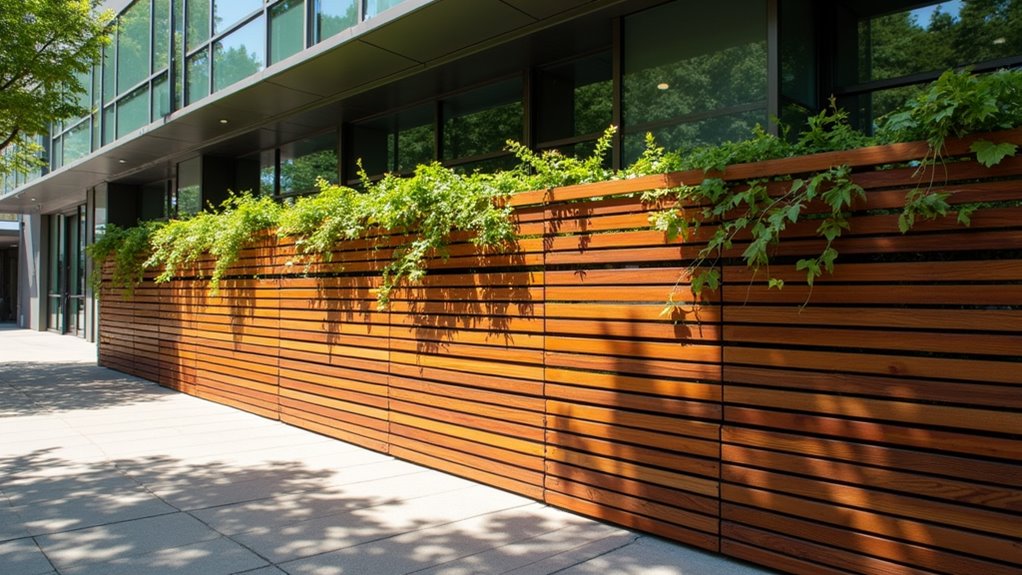
Once you've assessed your security needs, consider how your fencing choice can enhance your property's visual appeal. Aesthetics matter—an attractive fence can significantly boost your commercial space's look.
Start with color. Vinyl and aluminum fences come in various shades, so you can choose one that matches your brand or the building's style. Additionally, consider that customization options allow you to create a unique look that distinguishes your property from others. Choosing a vinyl fence can also provide aesthetic versatility through its wide range of styles and colors.
Next, explore design options. Aluminum and metal fences can feature stylish patterns that add sophistication without cluttering the space. Vinyl fences also offer an array of design possibilities, ensuring you find a style that complements your property beautifully.
If you prefer a natural vibe, wood and composite fencing can be tailored with different finishes and stains for a warm, welcoming feel.
Defining Property Boundaries
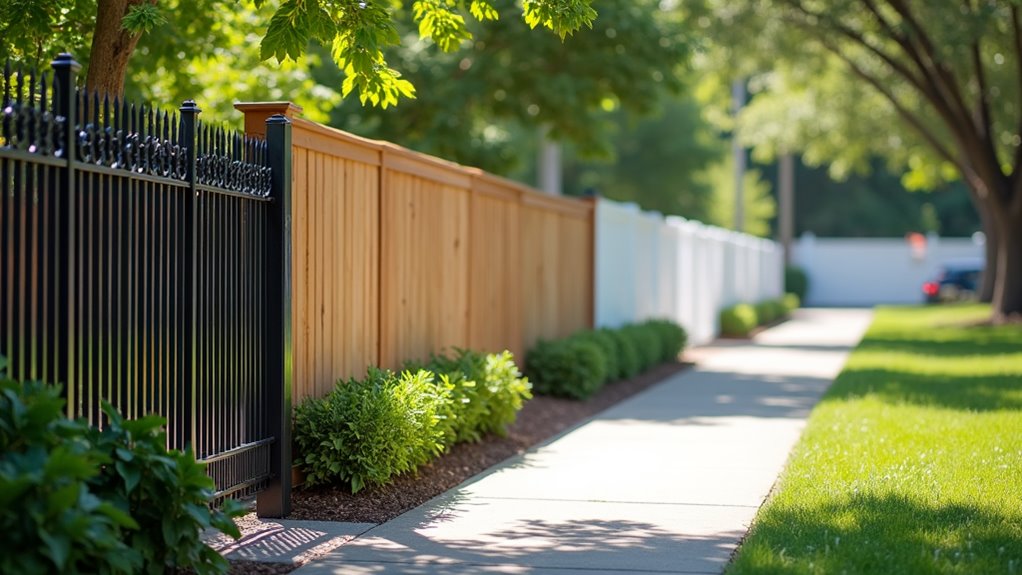
Defining property boundaries is crucial for any commercial property owner planning to install a fence. To ensure your fence is placed correctly, verifying your boundaries is key. Understand the difference between legal boundaries, which are outlined in property surveys and legal documents, and physical boundaries, which may not always match what you see.
Before you start digging, consider hiring a professional to conduct a property survey. This will give you accurate measurements and clearly mark your property lines, helping you avoid conflicts with neighbors. Remember, boundaries can change over time, so it's important to keep your property's legal description up to date. Additionally, being aware of the general boundaries rule can help you navigate any potential disputes regarding property lines. Having a clear understanding of property lines can also prevent misunderstandings with neighbors.
Also, be mindful of any easements that could impact where you place your fence. Easements grant others the right to use part of your property, and overlooking them can lead to legal issues.
Compliance With Regulations
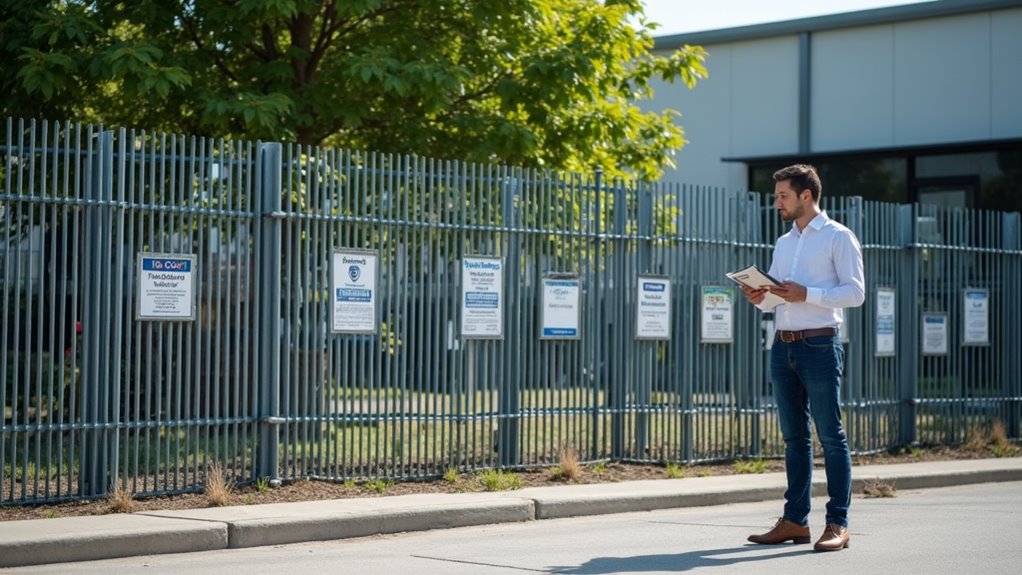
Understanding your property boundaries is crucial for navigating fencing regulations. Compliance with local zoning laws can save you from fines or having to remove your fence. Here's what to know:
- Material Restrictions: If your property borders residential areas, you may need to use specific materials like masonry or vinyl.
- Height Limitations: Most fences shouldn't exceed six feet unless you secure special approval for security reasons.
- Permit Requirements: Always obtain a Miscellaneous Building Permit before installing your fence; neglecting this can cause delays.
- Non-Conforming Fences: If your existing fence doesn't meet the new regulations, you can't modify it without proper approval.
To ensure zoning compliance, check your materials and height against local laws. Staying on top of maintenance keeps your fence in good shape and helps maintain a positive relationship with your neighbors and local authorities. Additionally, compliance with local regulations is vital for avoiding costly penalties and ensuring the longevity of your fencing investment.
Types of Fencing Materials
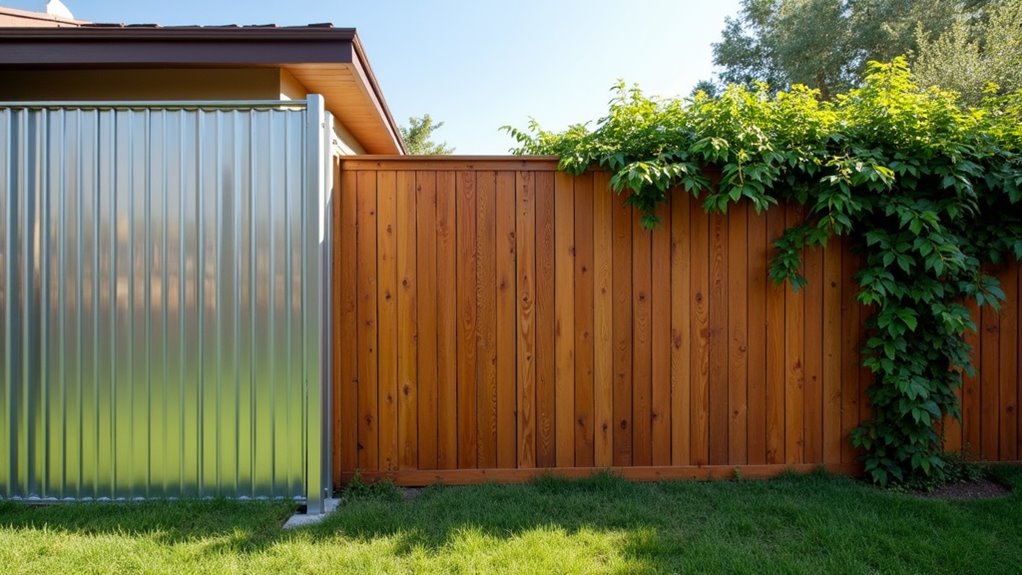
When selecting fencing materials for your commercial property, consider cost, durability, and appearance. Options like chain link, vinyl, and wood each have their pros and cons. For example, chain link is cost-effective and low-maintenance, while vinyl offers a polished look and won't rot. Additionally, chain link fencing is a popular choice for commercial applications due to its strength and durability. Chain link fences are composed of interlocking metal links, making them a robust option for boundary fencing. Wood provides a classic aesthetic but requires regular upkeep. By weighing these factors, you can choose a fence that secures your property and looks great.
Cost and Budget Considerations
Choosing the right fencing for your commercial property can be tough, but focusing on costs makes it easier.
Here's a simple breakdown of key budget factors:
- Material Costs: Chain link fencing costs between $15-$18 per linear foot, while vinyl is pricier at $25-$40. Material choice directly impacts overall installation cost, so choose carefully.
- Labor Costs: Installation can get pricey depending on the land's layout and how easy it's to access. Average labor costs around $8 per linear foot; remember to include prep work in your estimates.
- Permits: Often ignored, permit costs depend on your project's size and complexity, so make sure to include them in your budget.
- Additional Features: Extras like gates, security cameras, and lighting can significantly increase your overall expenses. All additional factors must be considered for accurate estimates.
Aesthetic Appeal Options
Once you have a budget for your commercial fencing project, the next step is to consider the aesthetic appeal of different materials. The right choice can enhance your property's look and reflect your brand's identity.
Here's a quick overview of popular fencing materials and their visual impact:
| Material | Aesthetic Appeal | Best For |
|---|---|---|
| Aluminum | Modern and sleek | Contemporary settings |
| Wrought Iron | Classic and refined | Traditional, upscale |
| Vinyl | Clean and versatile | Modern designs |
For example, aluminum offers a lightweight elegance, while wood provides a sturdy charm. Steel can give a professional look that elevates your brand. You might also consider adding decorative elements like unique gates or ornamental features to enhance your fence's appeal. Mixing materials, such as combining wood with steel, can create a striking visual effect. Additionally, incorporating sustainable materials into your fencing design not only contributes to a positive brand image but also appeals to environmentally conscious customers.
In the end, your fencing choices should not only protect your property but also create a welcoming and distinctive atmosphere for your business.
Durability and Maintenance Needs
When selecting a fence for your commercial property, focus on durability and maintenance to ensure long-term satisfaction and cost-effectiveness. The materials you choose will influence both how long the fence lasts and how much upkeep it requires.
Here's a quick look at some options:
- Wrought Iron: Very strong and can last over 20 years but needs regular painting to prevent rust.
- Vinyl Fencing: Low-maintenance and weather-resistant, it typically lasts longer than wood and is easy to clean with just soap and water.
- Chain Link: Budget-friendly and easy to repair, it requires minimal upkeep and holds up well in various weather conditions.
- Aluminum Fencing: Corrosion-resistant and durable, it requires little maintenance, making it ideal for busy areas. Additionally, selecting durable materials can help you achieve a fence that meets your security needs while keeping maintenance low and your budget in check.
Cost Analysis and Budgeting
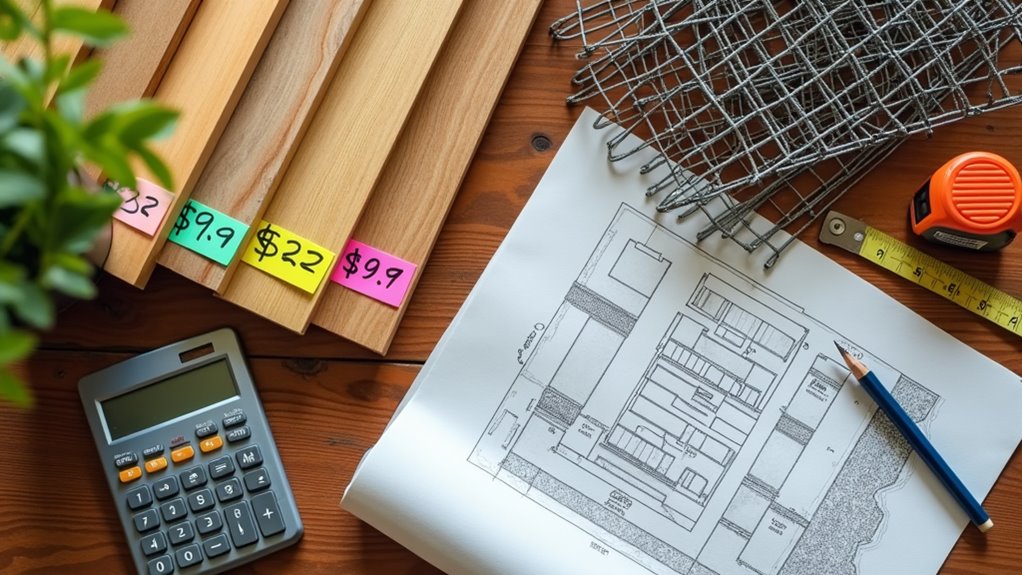
When budgeting for fencing your commercial property, it's essential to understand the costs involved.
Start by considering material prices: chain link fencing costs between $5 to $30 per linear foot, vinyl ranges from $25 to $40, wood is typically $10 to $30, and metal can be anywhere from $20 to $100. Each fencing type has specific characteristics and cost implications that can affect your overall budget.
Next, include installation and labor expenses, which average around $8 per linear foot. However, these costs can increase due to factors like fence height, customization, or challenging terrain.
Don't forget about permits and additional fees, as these can impact your overall budget.
Each project is unique, so it's crucial to break down costs thoroughly. Assess your business needs and security requirements, and gather quotes from multiple contractors to forecast costs accurately and find the best deal.
Long-Term Maintenance Costs
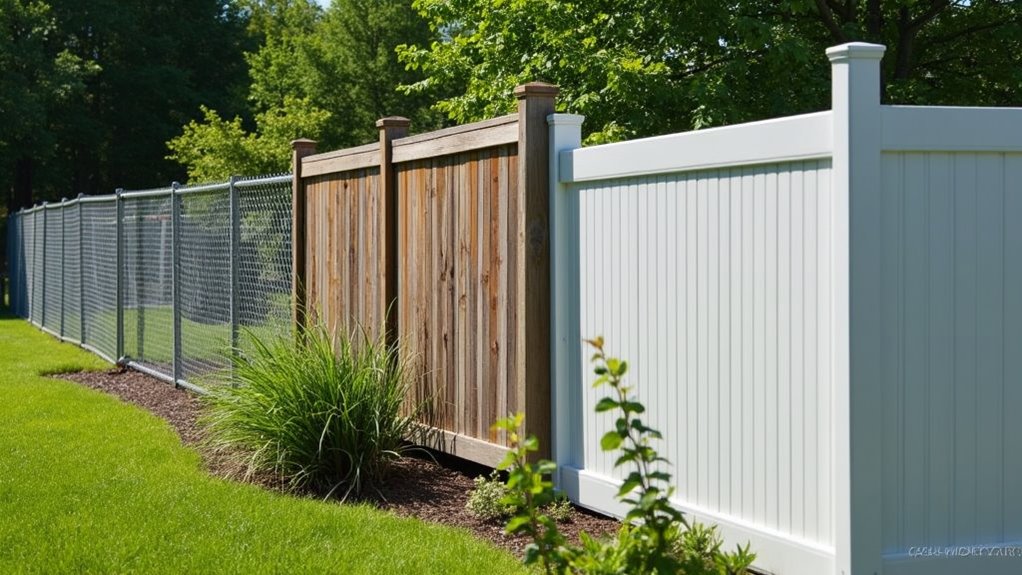
Long-term maintenance costs can significantly affect your budget and efficiency when it comes to commercial fencing. As you choose fencing materials, consider the maintenance frequency and costs. Here are key points to keep in mind:
- Material Choice: Opt for low-maintenance materials like vinyl, or be ready for the upkeep that comes with wood or wrought iron.
- Fence Length: Longer fences increase both labor and material costs for maintenance.
- Height: Taller fences can raise both material and upkeep expenses.
- Terrain: Fences on slopes or in tricky areas require specialized labor, which adds to costs.
By understanding these factors, you can forecast future expenses and choose a fencing option that fits your needs.
For example, while chain link may need occasional rust treatment, wood fences require regular staining.
Planning for these expenses helps you avoid surprises later.
Prioritize your long-term maintenance strategy now to save time and money in the future. A well-maintained fence enhances the security and professionalism of your commercial property.
Durability of Fencing Options
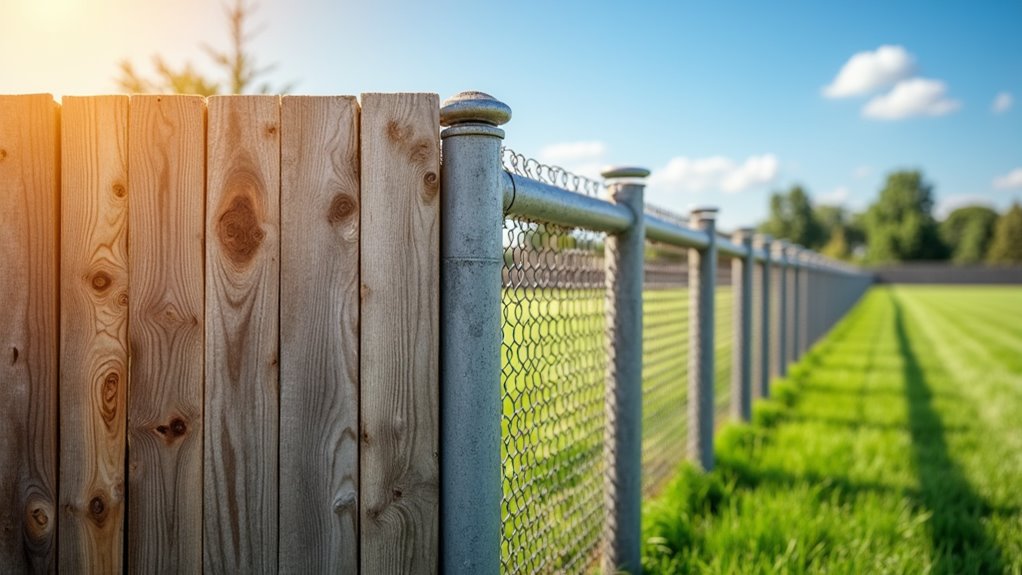
Choosing the right fencing for your commercial property depends on durability and your specific needs.
Here's a quick rundown of common materials:
- Chain Link Fencing: Strong and low-maintenance, but lacks visual appeal and can be climbed easily.
- Aluminum Fencing: Resistant to corrosion and attractive, offering durability with minimal upkeep.
- Steel Fencing: Very durable and weather-resistant, perfect for high-security areas, but more expensive.
- Vinyl Fencing: Extremely long-lasting (over 20 years) and resistant to rot, warping, and pests, requiring little maintenance.
- Wood Fencing: Lasts 15 to 30 years, depending on wood quality and maintenance, but needs regular care to prevent deterioration.
Consider what matters most to you—security, looks, or weather resistance—so you can choose a fencing option that meets your needs and endures over time.
Repair and Upkeep
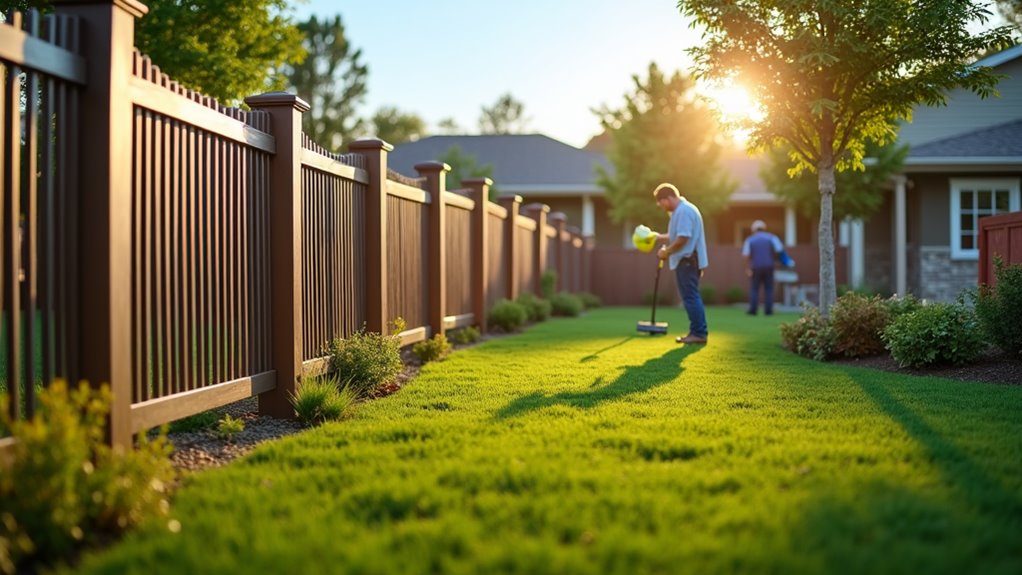
To maintain your fence effectively, it's important to know the upkeep needs for each material.
Look into different repair options and their costs to protect your investment and keep it looking good.
Regular seasonal maintenance not only boosts durability but also helps avoid expensive repairs later on.
For example, staining a wooden fence can prevent rot and extend its life.
Maintenance Requirements by Material
When selecting a fence for your commercial property, consider the maintenance each material requires. This will impact how long your fence lasts and how often you'll need to care for it.
Here's a simple breakdown:
- Metal Fences: Need rust-proof coatings and regular checks to prevent corrosion.
- Vinyl Fences: Low maintenance; just clean with soap and water occasionally. They resist rot and pests but may fade over time.
- Wood Fences: Require regular staining and pest inspections to avoid rot and water damage.
- Chain Link Fences: Should be cleaned regularly and inspected; replace damaged links and tighten wires as needed.
Choose a fence that matches your maintenance capacity.
By understanding these needs, you can find a fence that enhances your property and fits your upkeep plan.
Regular inspections and care are key to keeping your fence in good shape!
Repair Options and Costs
When considering fence materials, it's important to understand repair options and costs.
For chain link fences, replacing sections costs about $10 to $30 per linear foot, while rust treatment can range from $50 to $150.
Wood fences require more upkeep; replacing a board is typically $5 to $20, but treating rot can be as high as $300.
Vinyl fences are durable and low-maintenance. Minor cracks can be fixed with a repair kit, but significant damage may need professional help, with costs varying.
Aluminum fences are long-lasting, with section replacements costing between $30 and $100 per linear foot, requiring minimal maintenance.
Seasonal Upkeep Practices
Maintaining your commercial property's fence is crucial for its longevity and functionality. Seasonal checks can help you catch issues early and manage moisture effectively.
Here are some essential tips:
- Clear Debris: Remove leaves and branches that can trap moisture and cause decay.
- Weatherproof: Apply protective coatings, especially before winter, to prevent rust and extend lifespan.
- Inspect for Damage: Look for signs of wear, like brittle materials or weak posts, to ensure your fence remains sturdy.
- Manage Vegetation: Trim back bushes and vines to avoid damage and moisture buildup that can weaken the fence over time.
Design Versatility
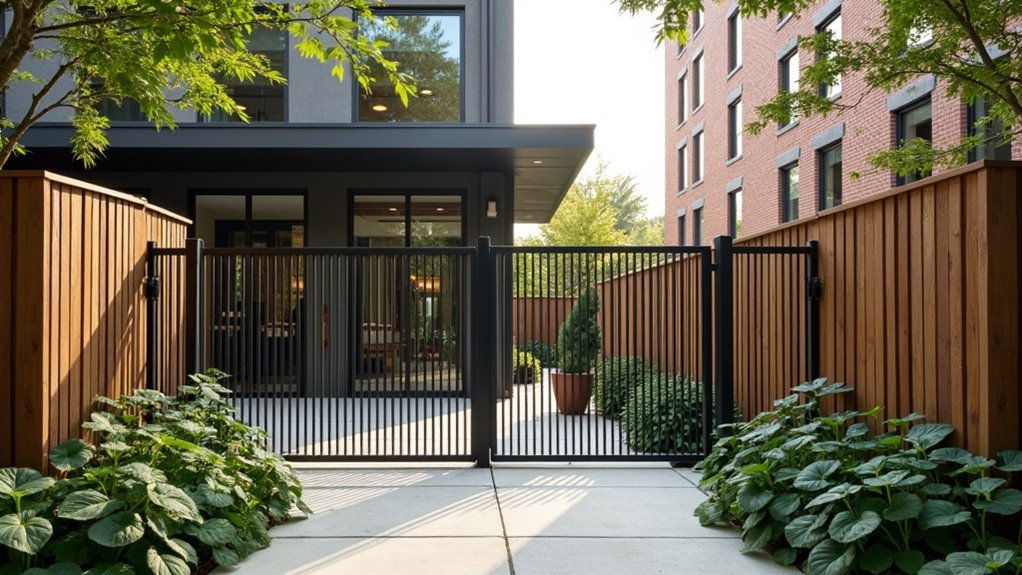
When choosing a fence for your commercial property, design versatility is crucial for both function and appearance.
Today's fencing options offer a range of materials tailored to your needs. For example, chain link fencing can be enhanced with additional materials to boost security and aesthetics. It's also easy to install and customize for any property size.
Aluminum fencing is another excellent choice, combining durability with an elegant look while requiring minimal maintenance. It can even mimic the appearance of more costly materials like wrought iron and can be tailored to accommodate slopes and unique gate sizes.
Current trends focus on flexibility, allowing you to pick materials, colors, and textures that reflect your brand. Eco-friendly options, like recycled wood or sustainable metals, are becoming popular.
Additionally, smart fencing systems incorporate technology for added security. Ultimately, your fence shouldn't only provide protection but also enhance the visual appeal of your commercial space.
Matching Property Architecture
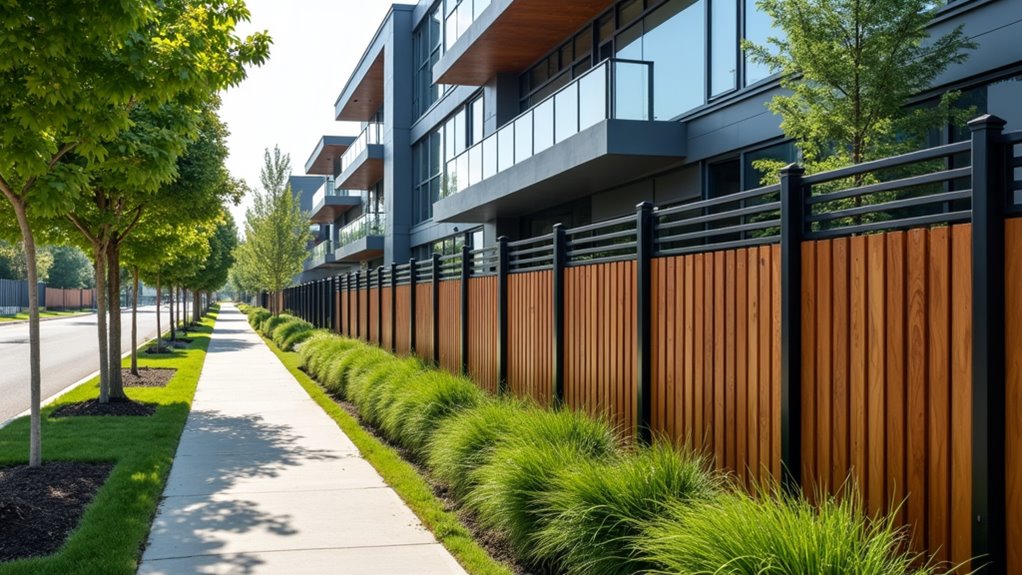
Choosing a fence that matches your property's architecture can significantly enhance its appearance. Here are four key points to consider:
- Material Matters: Wrought iron adds a timeless touch, while wood offers a cozy, natural vibe, perfect for older homes.
- Visual Consistency: Ensure the fence complements your property's design. It should enhance, not clash with, the overall look.
- Style Suitability: For modern homes, aluminum or steel provides a sleek finish, while decorative styles suit traditional properties better.
- Security vs. Beauty: Your fence should prioritize security but also look good. Think about open designs for visibility or solid ones for privacy.
Local Zoning Requirements
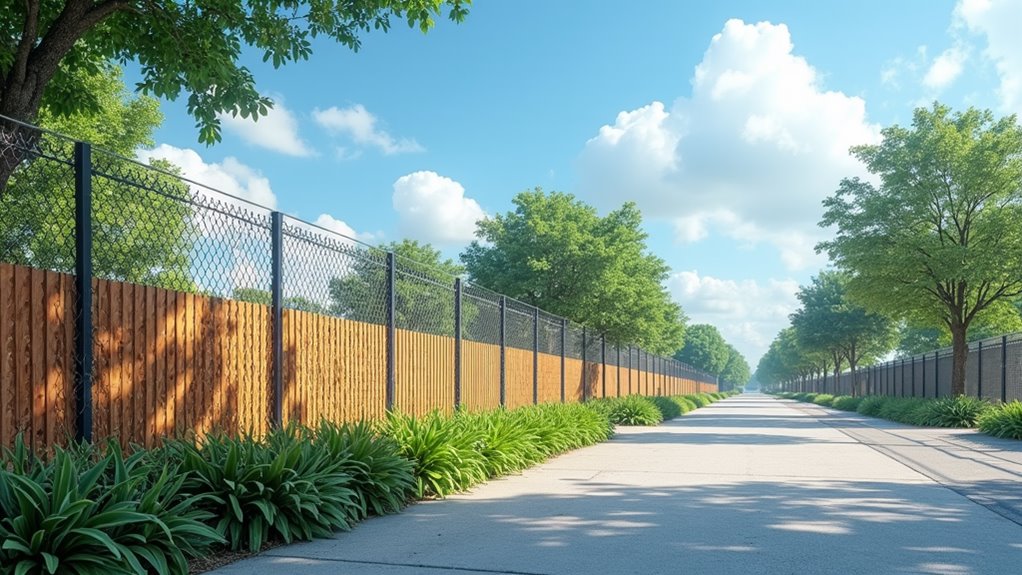
Understanding local zoning requirements is essential for choosing the right fence for your commercial property. Zoning rules differ by district and can dictate height, materials, and placement. To steer clear of issues, get to know your zoning district's regulations and check with local zoning offices.
Here's a quick look at important zoning factors:
| Zoning Aspect | Commercial Property | Residential Property |
|---|---|---|
| Typical Height Limit | Up to 8 feet or more | Usually 6 feet |
| Material Restrictions | Wood, vinyl, chain link, wrought iron | Similar, but can differ |
| Permit Requirements | Required; may need engineered plans | Typically simpler, but verify local rules |
If your preferred fence doesn't meet regulations, you might need to apply for a zoning variance. Additionally, some neighborhoods may require approval from neighboring property owners. Always ensure you're informed and compliant to avoid fines or costly changes down the line.
Hiring Professional Installers
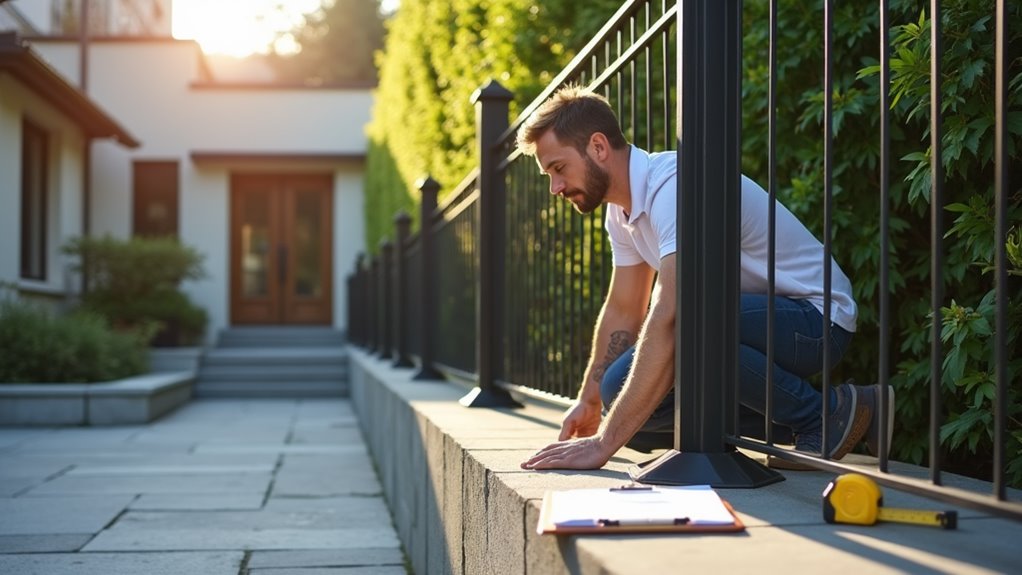
After understanding local zoning requirements and selecting the right fence for your commercial property, the next step is hiring professional installers. Choosing the right team is crucial, as their skills affect the quality and durability of your fence.
Here are four important factors to consider when selecting your installers:
- Experience: Find contractors with a proven track record in commercial installations.
- Credentials: Ensure they've valid licenses, certifications, and insurance for compliance and protection.
- Portfolio: Check their previous work to assess craftsmanship and detail.
- Reviews: Look at customer feedback to evaluate reliability and satisfaction.
Effective communication with your installer is key. A good contractor will discuss your needs and preferences, plan carefully, prepare the site, and install the fence with precision.
This results in a durable fence that meets your aesthetic and functional needs. By hiring professionals, you're investing in quality, efficiency, and ongoing support for your commercial fencing project.
Frequently Asked Questions
What Is the Average Lifespan of Different Fencing Materials?
Wood fencing typically lasts 4 to 30 years, based on how well it's treated, while vinyl fencing can last between 20 to 40 years. Regular maintenance for both types can help extend their lifespan, making your investment more durable against the elements.
How Do I Choose a Fence Color for My Business?
When picking a fence color for your business, think about what colors represent your brand. For instance, blue can convey trust, while green often suggests growth. Make sure the fence color complements your building and the surrounding area. A well-chosen color not only boosts your property's appeal but also connects with your customers.
Can I Install the Fence Myself to Save Costs?
Installing a fence yourself can be challenging. Think of it like putting together a puzzle; without the right pieces and guidance, it can get frustrating. While DIY might save money upfront, mistakes can lead to costly repairs and more time spent fixing issues. Consider your skills and the complexity of the project before diving in.
What Are the Most Common Mistakes in Commercial Fencing Installation?
When installing commercial fencing, it's easy to make mistakes like overlooking regulations or using the wrong tools. Always check the property lines, ensure posts are set deep enough, and follow local codes to prevent expensive issues down the line.
How Can I Ensure My Fence Complies With Future Regulations?
To ensure your fence meets future regulations, stay informed about local zoning laws and building codes. For example, if your area updates height restrictions or material requirements, be ready to adjust your design accordingly. Regularly check with your local planning department to keep your fence compliant and visually appealing in your neighborhood.
Conclusion
Selecting the right fence for your commercial property can be straightforward. Instead of worrying about costs, think about the long-term advantages: better security, enhanced appearance, and increased property value. A good fence not only safeguards your investment but also reflects your business's image. Assess your needs and consult with professionals to find a fence that balances functionality and style. Make a wise investment, and you'll see your property benefit from the right choice!
